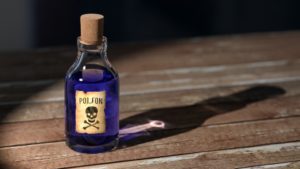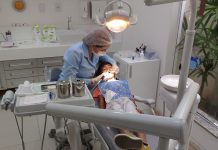 I’ll be the first to admit: I’ve had to call the poison control hotline for my child. Ask any seasoned parent out there, and I guarantee you, the majority of them have had to call poison control at some point. In that moment of parental panic, it’s a relief to know that Regional Poison Control Center at Children’s of Alabama (RPCC) is there to keep our kids healthy and safe. Accidents happen, and not only does RPCC save lives, but it saves the sanity of panicking parents and caregivers. Thankfully, there is no judgment on the other end of the phone.
I’ll be the first to admit: I’ve had to call the poison control hotline for my child. Ask any seasoned parent out there, and I guarantee you, the majority of them have had to call poison control at some point. In that moment of parental panic, it’s a relief to know that Regional Poison Control Center at Children’s of Alabama (RPCC) is there to keep our kids healthy and safe. Accidents happen, and not only does RPCC save lives, but it saves the sanity of panicking parents and caregivers. Thankfully, there is no judgment on the other end of the phone.Ann Slattery, the Director of the Regional Poison Control Center at Children’s of Alabama was kind enough to talk with us at Birmingham Moms Blog and empower us further with valuable information.
Where it All Began
The RPCC was originally founded in 1958, and in 1978, it became the first poison control center to offer a statewide toll-free 1-800 number. The RPCC believed parents shouldn’t have to pay to find out if they need to load everyone up in the car and head for the emergency room.
All phone calls are answered by healthcare professionals specifically trained to handle emergency situations and are available to take your call 24 hours a day/seven days a week. Need to be reassured you’re not the only parent who has had to call poison control? The RPCC currently takes 100,000 calls and follow-up appointments annually. Let me repeat: fabulous parents and caregivers have to call the RPCC, and they have found it to be a safe, judgment-free zone.
Facts and Tips
The RPCC website has links with facts about various poison concerns including:
- Lead
- Common Household Items
- Toxic (and non-toxic) plants
- Venomous snakes and poisonous insects
The RPCC has also provided us with tips that are especially essential around the holidays:
-
Exposures to poisons occur most often when families are out of their routines, particularly at the holidays and when traveling. When an event occurs (hosting for holidays, being in someone else’s home, etc.), be extra mindful.
-
Did you know that 46% of child-related calls are from accidentally consuming grandparents’ medications?
 [On a personal note, I can think of at least THREE separate occasions off the top of my head where various visitors in our home have accidentally left prescription medication on our bathroom counter as well as on the floor. I shudder to think what could have happened if my then-toddlers had found them and ingested them, thinking the pills were candy. Even the most vigilant of relatives and visitors can forget.]
[On a personal note, I can think of at least THREE separate occasions off the top of my head where various visitors in our home have accidentally left prescription medication on our bathroom counter as well as on the floor. I shudder to think what could have happened if my then-toddlers had found them and ingested them, thinking the pills were candy. Even the most vigilant of relatives and visitors can forget.] - Adults: remember to put poisonous cleaners, medications, and anything else hazardous out of reach and out of sight.
- Be extra cautious with medications that need to be refrigerated. Children assume everything in the fridge is edible. Put meds inside containers, then inside sealed brown sacks away from snacks.
- Remember, there is no such thing as “childproof” — just child-resistant. Door latches, safety lids, etc. simply slow kids down, but to truly be safe, medications and cleaning supplies have to be out of reach.
Button Battery Dangers
One often-overlooked danger for children comes from accidentally ingesting button or disc batteries. “These are in so many different products,” Ann Slattery says. “They are in greeting cards, remotes, hearing aids, and watches, even in children’s toys, so they might get a hold of them.” In other words, with the upcoming holidays, be sure to check any and all toys your children receive to make sure the batteries are housed in a screwed-on compartment that’s difficult for children to open.
Upwards of 56,000 disc battery ingestions were reported to the National Poison Data System between between 1985 and 2009, and 60 calls were made within our state over the past three years. When ingested, it’s imperative to have your child x-rayed to determine the battery’s location and to see if surgery is required.
Oftentimes, parents don’t see their child ingest the small battery, so it’s crucial to understand the symptoms following possible battery ingestion: choking, coughing, irritability, loss of appetite, and fever.
For additional information, please watch this video featuring Ann Slattery talk further about battery hazards.
Thank You, RPCC
We at Birmingham Moms Blog so appreciate the history and mission of RPCC, the years they’ve spent assisting families, and the countless lives they have saved.
Remember, Mom, you’re doing a great job. Accidents happen, and know the RPCC is always just a phone call away.
P.S. Post this number on your fridge and add it to the contacts in your phone: 1-800-222-1222.











